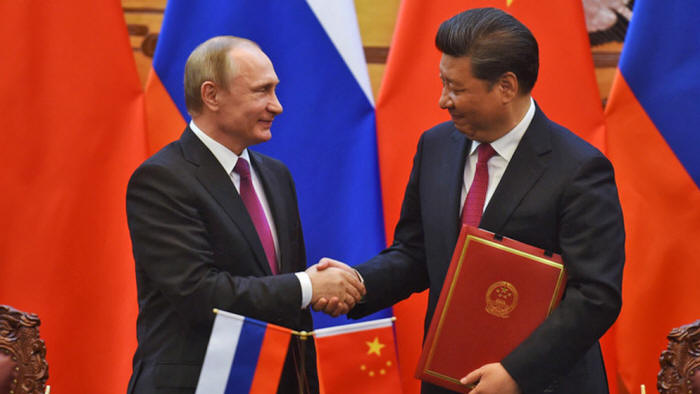|
by Ivan Timofeev Program director of the Valdai Club April 15, 2024 from ValdaiClub Website translation by RT Team April 16, 2024 from RT Website
shakes hands with Chinese President Xi Jinping.
© Greg
Baker-Pool/Getty Images
has not experienced a crisis like today's since the end of the Cold War; that has created an opportunity for real change...
He also expressed the country's readiness to
engage in a substantive discussion on this matter with the relevant
parties and organizations.
Moscow's top diplomat informed the press about an agreement with China to begin a discussion on the structure of security in Eurasia; a topic addressed during his visit.
The fact that Putin's proposal was on the agenda
between the two major countries suggests that it may take concrete
form, both in terms of political theory and practice.
During his visit to Beijing, Lavrov directly linked the need for a new framework with challenges to Euro-Atlantic security, which is centered on NATO and the Organization for Security and Cooperation in Europe (OSCE).
References to the Euro-Atlantic experience are significant for two reasons.
Russia, as a result, has increasingly seen NATO expansion as a threat to its own security.
Instruments such as the Russia-NATO Council have
been unable to address the growing tensions. The lack of effective
and equitable institutions that could effectively address the
concerns of Russia and fully integrate it into a common security
framework has led to increasing estrangement and, ultimately, a
crisis in relations with the West.
The culmination of these events has been the Ukrainian crisis, which has reached its military phase and will ultimately determine the final state of emerging security divisions in Europe.
Against the backdrop of the ongoing military conflict between Russia and Ukraine, an intensifying and growing confrontation between Russia and NATO has emerged.
This conflict has not yet escalated into a fully-fledged military phase, but it manifests itself in various other dimensions, including information warfare and the provision of direct and comprehensive military assistance from Western countries to Ukraine.
The Euro-Atlantic region has not faced such challenges since the end of the Cold War.
The experience of the failure of the Euro-Atlantic project highlights the need for the creation of a new framework with different principles and foundations.
Firstly, this new framework should be based on cooperation between several actors and should not rely solely on the dominance of any one party, such as that of the United States in NATO.
In this regard, it is significant that
consultations on Eurasian security matters have begun between Russia
and China - two major powers and permanent members of the United
Nations Security Council.
These steps, however, are not confined to Russian-Chinese bilateral relations, but also leave room for the participation of other countries interested in contributing.
It is not limited to military matters (although these remain fundamental), but encompasses a broader range of issues, including "hybrid threats" such as,
The unresolved nature of these issues in Russia-West relations was one of the preconditions for the current crisis.
The principle of the indivisibility of security,
which has not been realized in the Euro-Atlantic project, could and
should be a core principle for the Eurasia region.
Rather, it is likely that we will witness a prolonged process of development and refinement of the contours and specifications of the new framework.
Existing institutions and organizations such as
the Shanghai Cooperation Organisation (SCO) may be utilized to this
end. The experience gained could then be transformed into permanent
institutions focusing on a wider range of security issues.
NATO originally emerged as an instrument of
deterrence against the Soviet Union, but today it has been given a
new lease of life as a deterrent against Russia.
At least the idea of jointly countering the US
has support in both Moscow and Beijing.
At present, there are many unanswered questions regarding the parameters of the Eurasian security framework.
These issues will need to be addressed both
through diplomatic channels and through dialogue between
international experts from the relevant countries.
|


